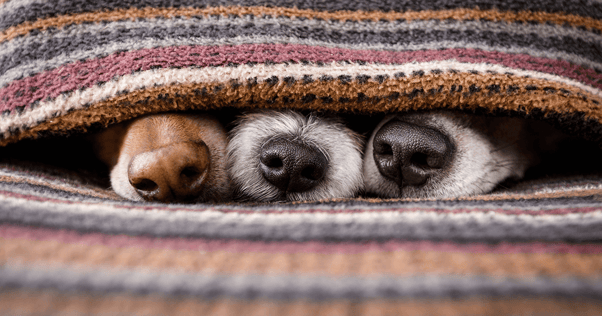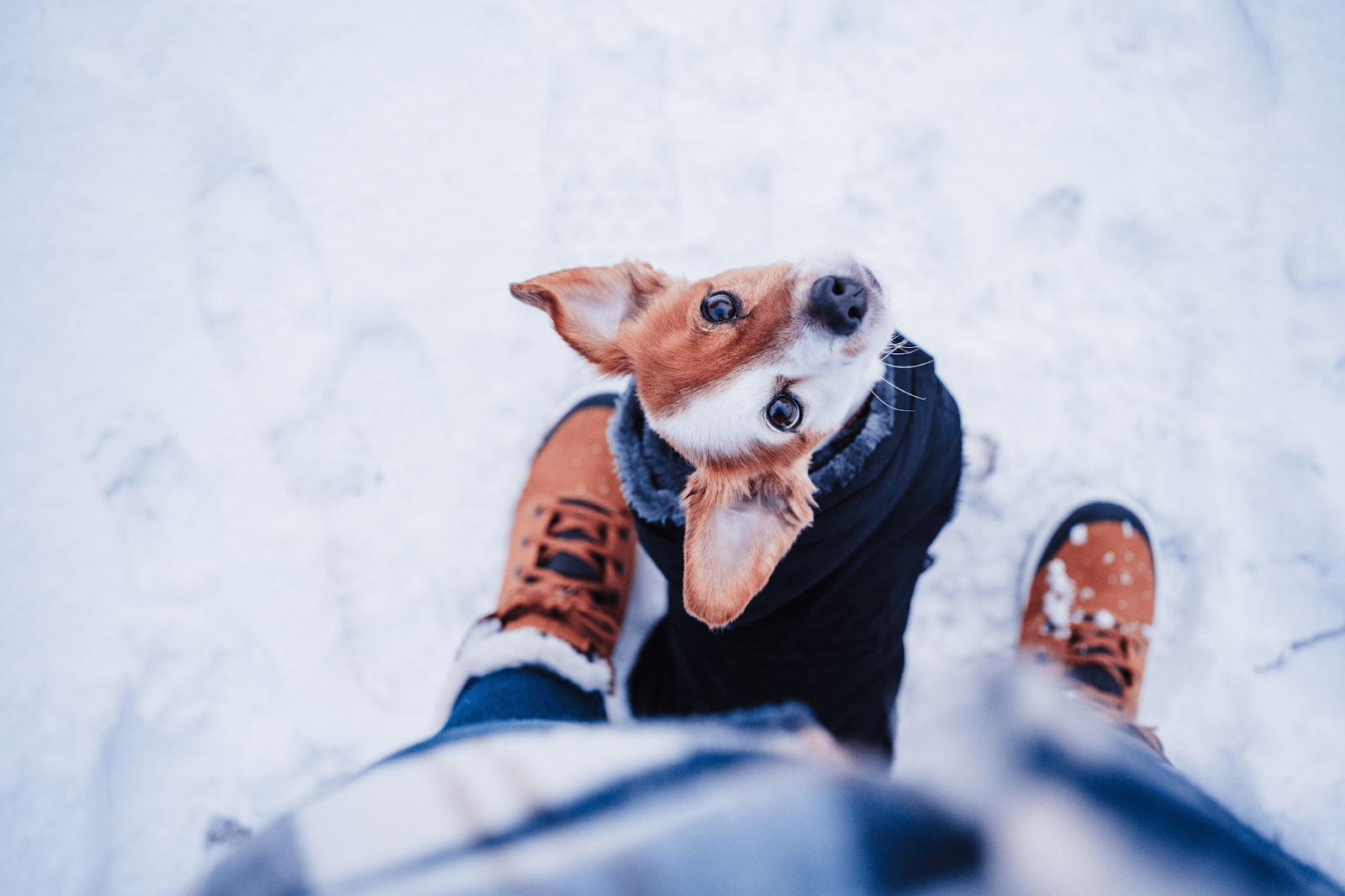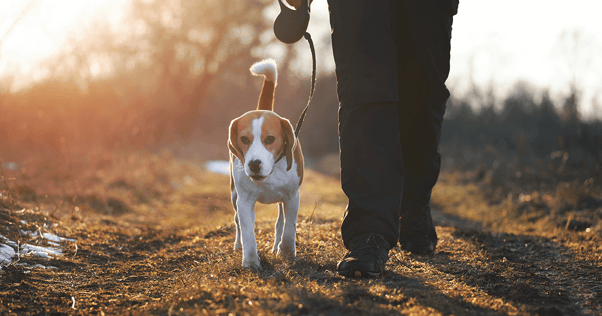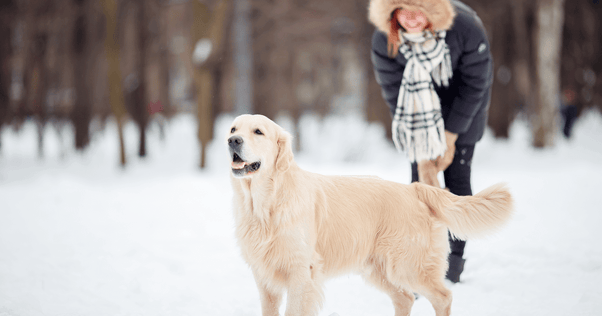As the weather turns cold and the days shorten, it’s not uncommon for us humans to start feeling those winter blues. In fact, so widespread is the condition that it was given the scientific name of seasonal affective disorder, or SAD for short. This naturally raises the question for us pet-lovers, can dogs get seasonal depression too? We’re exploring the subject and sharing a few tips on helping dogs in cold weather!
Do Dogs Get Seasonal Depression?
While humans are known to suffer from SAD, there’s no scientific evidence to suggest that dogs suffer from the same condition. One of the main causes of seasonal affective disorder is thought to be reduced exposure to natural light. After all, natural light plays a crucial role in regulating the body clock and the production of ‘happy hormones’. It’s possible that dogs rely on natural light in the same way as humans, using it to maintain their mood and energy levels, but we don’t know this for sure.
That said, this doesn’t mean our furry friends aren’t being affected by the winter season! The turn in weather often leads to changes in a dog’s routine. For example, this can include exercising at different times of day or in wet, cold conditions. This can be stressful for dogs in winter and may account for any seasonal changes in their mood or behaviour.

Interestingly, a study from 2007 revealed that a third of dog caregivers noticed signs they associated with depression in their dogs in cold weather, such as sleeping more and eating less. However, it’s important to remember this isn’t necessarily due to SAD itself.
Signs Your Dog Might Be Feeling The Winter Blues
Though we don’t know for certain whether dogs can get seasonal depression, we should still be observant of any signs that they may not be feeling their best. If you’re concerned your dog could be affected by SAD or is struggling with the cold weather, watch out for these behaviours:
- Reduced interest in playing games or interacting with you
- Appearing lethargic and sleeping more than usual
- A noticeable change in appetite
- Behaving differently, such as being less able to settle or chewing objects more often
If you do notice any significant change in your dog’s behaviour, don’t just put it down to the season. It could be that there is an underlying medical issue affecting your dog. For example, this could be a hidden pain resulting in a ‘low’ mood. In such a situation, it’s always best to consult with your vet. They’ll be able to advise whether there’s anything to be concerned about and can provide advice accordingly.

Similarly, it also helps to remember that every dog has its own personality. In short, you shouldn’t compare your dog’s behaviour with other dogs. Some might naturally be more energetic, while others are more laid-back. It’s essential to understand what makes your dog happy and ensure those things are consistent, especially during the winter months.
Supporting Dogs In Cold Weather
There are a number of reasons why a dog’s behaviour could be different in winter. We’ve rounded up a few of the main reasons below and have included some advice to help them get through the cold weather:
- Change in routine – Dogs thrive on consistency. A sudden shift in their daily routine, due to the cold and wet conditions of winter, can often unsettle them. One option to counter this is to use an ADAPTIL Calm Diffuser near their bed. This works by releasing appeasing pheromones, ensuring they feel safe and secure at home.
- Mental and physical stimulation – While exercise is a known mood-booster, so is mental stimulation. Dogs in winter might spend limited time outdoors, so incorporate indoor activities such as scent games, hidden treats, or puzzle feeders. These can be highly effective in keeping a nervous dog engaged and happy.
- Sunlight – Just as sunlight is beneficial for humans, the same is potentially true for dogs too. Make an effort to let as much sunlight into your home during the day and maintain outdoor walks whenever possible. Even if the weather is less than perfect, walks during daylight can benefit both you and your dog. If you’re unable to walk your dog during the daylight hours, consider seeking the help of a dog walker.

- Social interaction – Dogs are incredibly social creatures. They bond deeply with their families whether they have two legs or four! Even during busy winter months or festive seasons, it’s crucial to ensure you’re spending quality time together and having positive interactions.
- Your mood – Dogs are empathetic and can often mirror our moods. If you’re feeling down during winter, it’s possible that your dog might pick up on these emotions.
- Behavioural issues – If you have a nervous dog or notice consistent signs of fear or frustration, this might be due to underlying behavioural concerns. For instance, there may be things that happen more during winter that can be worrying, such as fireworks or more visitors to your home. It’s best to seek the advice of a vet and consult an accredited behaviourist. They will help you to understand any underlying issues your dog may have and advise how best to support them with an individual plan to lift your dog’s mood.

Would you like further advice for helping your dog in cold weather? Or are you interested in learning more about our calming vest for dogs? Get in touch and we’ll share all the advice we can! You can also stay informed with our latest tips and guides, as well as find information about our ADAPTIL range, by signing up to our newsletter.


